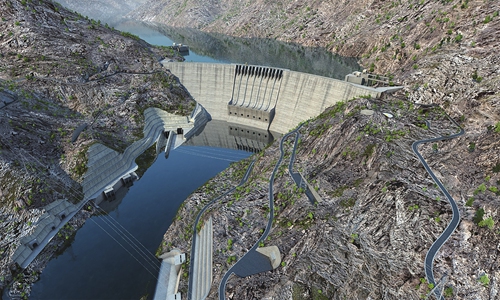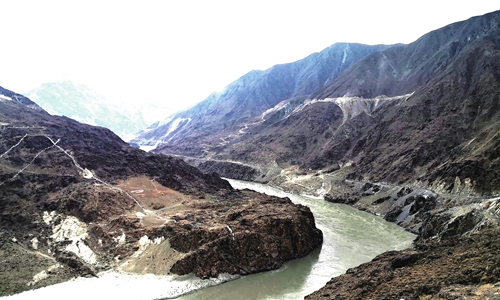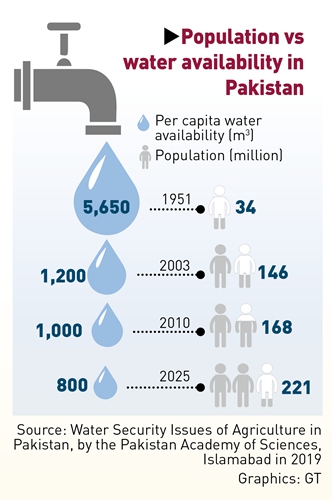China aids construction of Pakistan’s ‘Three Gorges Dam’ despite pandemic
By Dong Feng Source: Global Times Published: 2020/8/3 20:37:06

A virtual rendering of the Diamer-Bhasha Dam at its construction site Photo: Courtesy of the Economic and Commercial Office of the Chinese Embassy in Pakistan

A photo taken onsite Photo: Courtesy of the Economic and Commercial Office of the Chinese Embassy in Pakistan
Despite the novel coronavirus pandemic, China and Pakistan are stepping up efforts on committed projects focusing on cooperation in industrial development, agriculture and the improvement of people's livelihoods. The Diamer-Bhasha Dam and Power Project, nicknamed the "Three Gorges Project" by the Pakistani people, joins a long list of bilateral cooperation efforts between the two countries.As a country with an agricultural population accounting for about 60 percent of its total population and agriculture accounting for more than 20 percent of its GDP, the construction of the Diamer-Bhasha Dam is of great strategic significance for improving Pakistan's water security and sustainable development and it has therefore been supported by successive governments, Wang Zhihua, economic and commercial minister counsellor at the Chinese Embassy in Pakistan, told the Global Times, noting that a dam construction fund was specifically set up, with full support from those in all walks of life both in Pakistan and abroad.
Despite having more glaciers than any other country, Pakistan ranks the 14th most water-stressed country, facing extremely high water stress, according to the Pakistan Council of Research in Water Resources, which warned that Pakistan may run out of water by 2025.
In a UNDP joint report titled the Vulnerability of Pakistan's Water Sector to the Impacts of Climate Change, the findings were similar.
"Based on the United Nation's estimate of Pakistan's population in 2015, per capita water availability was just less than 1,000 cubic meters per person, classifying the country as water scarce," the report read.
Pakistan's agriculture sector, a major consumer of water resources, will bear irreparable losses with the productivity of staple crops reduced by up to 20 percent by 2050, according to the UNDP's report.
The report concluded that building water reservoirs to store flood water and provide water during dry spells was a priority action to make the country more water and food-secure.
"The Diamer-Bhasha Dam and Power Project - being the third largest dam in Pakistan - will achieve multipurpose objectives. It will increase the water storage capacity of Pakistan from 30 to 48 days. The people of Pakistan are grateful to China, which has once again decided to help Pakistan secure and ensure its strategic water security in the 21st century," Syed Hasan Javed, director of the Chinese Studies Center of Excellence at the National University of Science and Technology in Islamabad, told the Global Times.
The contract for this project was signed between Chinese energy firm PowerChina and Pakistan's Frontier Works Organization, with a value of 442 billion rupees ($2.75 billion). The project will be built in two phases.
"The Chinese company will extend and share all available technical experience with its Pakistani partner for the project. The dam is scheduled to be completed by 2029. During the construction of the project, 16,500 jobs will be directly created," Wang said.

Graphics: GT
PowerChina will share its experience in dam construction and large-scale project construction organization, said Wang.The Diamer-Bhasha Dam will contribute to the production of clean energy, help mitigate the impacts of climate change, lessen dependence on fossil fuel imports, reduce pollutant damage to the environment, assist with flood control and combat water shortages. It will bring revolutionary change and uplift the living standards of the people of Pakistan, Javed noted.
He said that the project is being built 315 kilometers upstream of the Tarbela Dam, at the confluence of Chilas in Pakistan's Khyber Pakhtunkhwa Province and Diamer in the Gilgit Baltistan region.
Some Western media have reported voices that oppose the Diamer-Bhasha Dam project.
"The Diamer-Bhasha Dam is beyond any controversy, being constructed by two sovereign nations. The people of Pakistan are deeply grateful to China for undertaking several energy projects, both under the China-Pakistan Economic Corridor (CPEC) as well as through contracted projects like this one, which have greatly reduced the electricity shortage in the country, improving the living conditions of the people and helping economic revival," Javed elaborated.
The project is currently in the initiation stage, with focus on supplementary surveys and organizational planning. The construction of the camp at the early stage has not been seriously affected by the pandemic, Wang said.
When compared to the Three Gorges Dam in China, the Diamer-Bhasha Dam will be seen as its "younger brother."
The Diamer-Bhasha Dam is designed to be 272 meters high and comprise 17.1 million cubic meters of roller-compacted concrete. Once completed, it will be the world's tallest and largest roller-compacted concrete dam, with an installed capacity of 4.5 million kilowatts and a storage capacity of 10 billion cubic meters, according to PowerChina's website.
"China has an excellent record of building huge dams not only for itself, but for other developing countries. The Pakistani authorities have completed all preparatory work related to land acquisition, resettlement, financial and operational mobilization, and the work has begun at the site," Javed said.
Referring to another media report that slandered the dam project as another "debt trap" set up by China, Javed said that Pakistan's external debt is roughly $111 billion out of a GDP (calculated at market price) of $265 billion as of June 2020. Almost 75 percent of Pakistan's debt is owed to international financial institutions such as the World Bank, IMF, Paris Club and Asian Development Bank.
"The total amount of Chinese loans does not exceed 10 percent at $11 billion. Pakistan can take care of it. The propaganda of China laying a 'debt trap' is guided by malicious intentions of detractors. If you see the external debt to GDP ratio, Pakistan is not among the most highly indebted nations of the world," Javed said.
RELATED ARTICLES:
Posted in: INDUSTRIES,ECONOMY